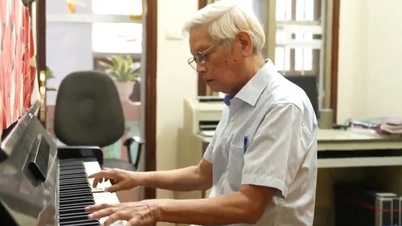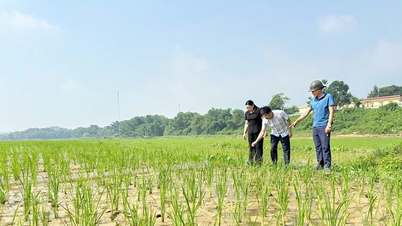A girl in Nghe An gave birth at the age of 15 (Photo: D. Hoang).
Innocent eyes, inexperienced children have to face the responsibility of being a mother and father when they are not yet mature. That is the heartbreaking reality of young people falling in love and having sex at an early age.
This is partly reflected in nearly 800 cases of "children giving birth to children" recorded within just 2 years at Hung Vuong University Hospital in Ho Chi Minh City.
Adolescence, with its strong psychological and physiological changes, is a stage when children are easily influenced by emotions and curiosity about gender.
Impact from living environment
Reading the news of thousands of cases of "children giving birth to children", Ms. Pham Hai, Deputy Director of an education company in Ho Chi Minh City, said she was sad but not surprised. Because her family owns a pharmacy, she has seen many students, still "baby-faced", innocently asking "adult things".
"What surprised me was that the girls were not embarrassed or worried, but calmly asked to buy emergency contraceptive pills, pregnancy tests, condoms... as if they were just asking to buy a regular pill," said Ms. Hai.
Having the opportunity to visit many schools, Ms. Hai also shared that nowadays, children's expressions of affection, especially in middle and high school, are showing more carefree and public expressions than before, even in the school environment.
Students are not shy when expressing intimate gestures such as holding hands, putting their arms around each other, hugging each other, or even kissing lightly in the schoolyard, classroom, or other public spaces such as the canteen or bench.
In addition, students can use sweet language such as "husband - wife", "husband - wife", "honey - honey". Some students even openly write the name of their lover on their hand or shirt.

The image was captured by Ms. Pham Hai of a 7th grade student openly writing love words on his arm (Photo: Character provided).
It is also this worrying calmness that makes MSc. Dinh Van Mai, lecturer of social work, Van Lang University, believe that early sexual relations and unwanted pregnancies are the result of deficiencies in sex education, life skills and proper love orientation.
During puberty, children are dominated by strong emotions, unable to control their behavior, and have not yet fully developed their cognition. Meanwhile, sensitive movies, videos , and images with unhealthy content are easily accessible through social networks or the Internet, causing children to be exposed to false information about sex early.
From there, they easily fall into unsafe relationships, lack understanding of the consequences, leading to unwanted pregnancies or sexually transmitted diseases.
“This leads to unsafe relationships and lack of understanding of the consequences,” the lecturer warned.
Sharing the same view, Dr. Nguyen Thanh Hoang, Director of the Psychology Program at Gia Dinh University, emphasized that the need to be loved, curiosity about gender and influence from the surrounding environment are factors that motivate children to enter into early romantic relationships.
"Curiosity about sex, hormonal changes, along with the influence of media, social networks and friends, create romantic love models, making children believe that love is proof of maturity," Dr. Hoang analyzed.
However, the doctor pointed out that many children confuse sexual attraction and the need for attachment with true love.
"Teenage love is often emotional, impulsive and lacks depth in terms of commitment, companionship and responsibility," he said.

A female student wearing a school uniform and carrying a backpack was taken by her boyfriend to a cafe with beds, where she comfortably lay down, cuddled, and talked in her own cocoon (Photo: Huyen Nguyen).
Explaining why adolescents are easily drawn into early romantic relationships, Dr. Hoang said that this stage has many psychological characteristics that make children vulnerable.
They are in the process of searching for personal identity, lack emotional control due to the underdeveloped prefrontal cortex, are easily influenced by friends and peer pressure, and have a rebellious mentality to assert their ego.
Mental shock and fear
The situation of "children giving birth to children" not only causes health consequences but also has a profound impact on the children's psychology. Many children are not aware of or underestimate the risks to reproductive health and do not imagine the psychological and social consequences after pregnancy.
MSc. Dinh Van Mai emphasized that the situation of "children giving birth to children" is a serious warning, requiring companionship, scientific guidance and closeness from families, schools and communities in taking care of children's reproductive health.
"They have to face great mental shocks, feel fear, guilt, shame, and even depression if they do not receive sympathy," Master Mai shared.
According to Mr. Mai, becoming parents when they are still immature causes children to lose their childhood, learning opportunities, personal development and friendships.
Many children are forced to stop studying, the pressure of raising young children in an economic and mental situation that is not yet ready leads to prolonged stress. This deeply damages self-esteem and creates barriers to future personality development.
A girl in Hanoi got pregnant and gave birth when she was only 12 years old (Photo: G.D.).
Get rid of the taboo of sex education
To equip adolescents with the knowledge and skills to build healthy relationships, both experts believe that comprehensive sex education should be promoted early.
Dr. Nguyen Thanh Hoang pointed out that awareness of responsibility and consequences in love and sexual relations at this age is still limited due to lack of adequate and scientific education.
He emphasized the role of scientific, age-appropriate sex education, along with enhancing life skills, emotional intelligence and school psychological counseling.
"Close cooperation between schools and families in creating a trusted space for children to share is extremely important," said Dr. Nguyen Thanh Hoang.
MSc. Dinh Van Mai also believes that it is necessary to strengthen training in refusal skills, emotional management, empathetic communication and listening to children share without judgment.
According to him, instead of considering sex education for children as taboo, we should be open, proactive and talk to our children sincerely, clearly explaining the consequences and responsibilities for sexual behavior.
“Parents and schools need to pay attention to using age-appropriate language to help children understand easily,” Mr. Mai emphasized.
A sex education class for children (Photo: Dan Sinh).
Besides family, according to Mr. Mai, the school needs to regularly provide psychological counseling as well as organize seminars and skills training for students to share, discuss and receive guidance.
Close coordination between three parties including parents, schools and experts is necessary to develop an educational network and monitor children's psychological and emotional development.
Experts say it is necessary to innovate child education methods by taking advantage of modern media forms such as podcasts, short films, social media channels, etc. to bring correct and accurate sex education messages closer to young people.
Ms. Pham Hai further emphasized that it is time for sex education for children to no longer be just empty words or something that parents are afraid of or avoid... Instead, it must become an essential part and be implemented proactively and scientifically in the family as well as in schools.
"I think that not only children need to be educated, but even parents and teachers need to learn how to teach knowledge to children," Ms. Pham Hai expressed.
In the context of modern society, when children have easy access to a wealth of information and are subject to many impacts from the external environment, equipping them with knowledge and life skills to protect themselves cannot be delayed.
Source: https://dantri.com.vn/giao-duc/hoc-sinh-than-nhien-mua-thuoc-tranh-thai-bao-cao-su-loi-canh-tinh-moi-nha-20250604000507084.htm






![[Photo] Chu Dau Ceramics – Proud of Vietnamese identity at Exhibition A80](https://vphoto.vietnam.vn/thumb/1200x675/vietnam/resource/IMAGE/2025/9/1/c62ab2fc69664657b3f03bea2c59c90e)
![[Photo] General Secretary receives heads of political party delegations from countries attending the 80th anniversary of our country's National Day](https://vphoto.vietnam.vn/thumb/1200x675/vietnam/resource/IMAGE/2025/9/1/ad0cb56026294afcae85480562c2e790)
![[Photo] Celebration of the 65th Anniversary of the Establishment of Diplomatic Relations between Vietnam and Cuba](https://vphoto.vietnam.vn/thumb/1200x675/vietnam/resource/IMAGE/2025/9/1/0ed159f3f19344e497ab652956b15cca)
![[Photo] Solemn reception to celebrate the 80th anniversary of the National Day of the Socialist Republic of Vietnam](https://vphoto.vietnam.vn/thumb/1200x675/vietnam/resource/IMAGE/2025/9/1/e86d78396477453cbfab255db1e2bdb1)
![[Photo] National Assembly Chairman Tran Thanh Man receives Cambodian Senate President Hun Sen](https://vphoto.vietnam.vn/thumb/1200x675/vietnam/resource/IMAGE/2025/9/1/7a90c9b1c1484321bbb0fadceef6559b)
![[Photo] People eagerly wait all night for the parade on the morning of September 2](https://vphoto.vietnam.vn/thumb/1200x675/vietnam/resource/IMAGE/2025/9/1/0cf8423e8a4e454094f0bace35c9a392)






















































































Comment (0)